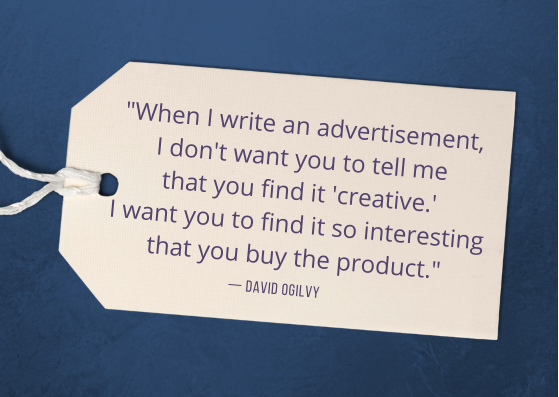At this one ad agency I knew of, their main copywriter was one of the few people who didn’t work in the building. Because he wasn’t really part of the team. Account executives would just send over some information. And he would send back the written copy.
Input. Output.
Now, copywriters can certainly be successful while working remotely. Many do.
But nailing that conversion copy takes much more than processing a marketing brief and turning it into copy. It requires digging into the subject matter and finding that gold nugget that helps the customer truly perceive the product’s value. You need intimacy with the product and its customers.
To do that, sometimes it helps the conversion copywriter to think more like a journalist. What is the story here? What is the lede (i.e., the important aspects that you open with to grab the reader)? To whom does it matter? And why?
That can also require digging for information beyond the marketing brief. And one way to get that info is to get out of your writing cave and interview a few key people. Interviews won’t give you the rigorous behavioral data that you can get from an A/B split test. But they can help you increase the intimacy with the product and its potential customers to improve your marketing copy.
Here are some ideas for questions you can ask key people. All of the questions are directional and should merely guide your conversation. Listen for key bits of information and ask follow-up questions to dive deeper anytime someone makes a vague statement like “Product X is better than Product Y” (How is it better?) or “The ads for Product X were misleading” (What about them was misleading?). And if you’re extroverted, please keep in mind your interview subjects should do way more talking than you.
And if you’re an inexperienced interviewer, don’t overlook the most powerful thing you can say … nothing. Most people naturally want to fill an awkward pause, and often provide very helpful information to fill the dead air as they think deeper. So leave plenty of room for pauses between questions as you take notes on what they say.
Company (and Key Partner) Employees
There is a wealth of wisdom within the company itself and from your key vendors and other partners. From an operations manager to quality control folks, from researchers and product developers to the very marketing manager who originally gave you the brief, company employees understand the value of the product or service being offered at a very deep level. And this can hold true for key partners as well — like outsource manufacturing or product support.
Much of the value these employees are aware of may never make it into a marketing brief. By interviewing them directly, you can minimize the disconnect between the perceived value communicated by the company’s marketing messaging and the actual value being delivered by the company.
I’m often surprised by just how big that disconnect can be. When I meet an employee of a company and ask them questions about what their company does (whether in a professional setting or at a dinner party), and then see that company’s advertising and marketing — many times I’ve thought, “Wow, they’re just not getting the value across at all.”
A great example is this article from Target Marketing magazine, where Denny Hatch shows how The New York Times obituary of Amar G. Bose was better at communicating the value of the product than the copy message in Bose ads.
The best place to dig for this value is in a value proposition workshop. But you also want to get some of this information from people who can’t attend the workshop.
Some questions to ask internally:
- Why did we launch this product?
- What work/research went into creating this product?
- What customer need does the product serve?
- How is the product better than competitors?
- Why should anyone believe us? What proof points do we have to make that case?
- How is it the same? Worse?
- How would competitors answer that same question — how is the product better than, the same as, or worse than other options in the marketplace?
- What type of customers does the product serve well?
- What type of customers does the product not serve well?
- What is the most interesting fact about this product that most people don’t know?
- What question did I not ask you but should have?
- Anything else to add? (don’t overlook the importance of this question, sometimes it produces your best answers)
Key information to listen for: People tend to write and speak differently.
When a marketer is crafting a written brief to send to a creative team, even if they’re not trying to, they tend to write more hype-filled copy. By just talking to them about the product, you will tend to get more straightforward answers. You want conversations based on facts, not hype.  Challenge any statement an employee makes that sounds like hype and ask them to back it up with a data point so you can write credible copy.
Challenge any statement an employee makes that sounds like hype and ask them to back it up with a data point so you can write credible copy.
Customers
One benefit of interviewing customers is that you forge a relationship with someone you can write directly to.
Powerful conversion copy isn’t written to a generic audience. It’s written with a specific person in mind, with their needs and wants, hopes and fears staring you right in the face. With their speaking cadence and reading level driving your word choices. A budget hotel is “clean” while a luxury hotel is “exquisite.” The same electric car model has “ludicrous acceleration” to a sports car shopper but “zero emissions” to an eco-conscious shopper.
Keep in mind, the feedback will be a bit skewed since you’re only talking to people who bought, not those who didn’t buy. Also, people don’t always realize why they act the way they do. As bestselling author Chip Heath has said, “people often decide based on emotion and backfill with logic.” With that understanding in mind, interviewing customers can be one input that helps you better understand and communicate with them.
Some questions to ask customers:
- Do you have a set of challenges around [whatever the product does]? Please describe those challenges.
- Why did you start shopping for this product?
- What research did you do when shopping? What were your most trusted sources of information?
- If you used a search engine, what words did you type in?
- Where else did you shop?
- What was better about those other products? Worse?
- What is better about our product? Worse?
- How do you use the product?
- Now that you own the product (or have used the service), how did it compare to your expectations? What is better than what you expected? Worse?
- Would you recommend this product? If so, to who specifically? What would you tell them about the product?
- What question did I not ask you but should have?
- Anything else to add?
Key information to listen for: It’s not just what customers say, it’s how they say it. You can hear some interesting sentiment from customers. But listen to their exact wording as well. Marketers and brands can sometimes use internally focused language or industry-heavy jargon when talking about their products. What words do your customers use? Hearing straight from the source can help you speak their language when writing copy for them. These subtle nuances in your copy can subconsciously let customers know that your product is for people like them.
Customer-Facing Employees
It isn’t always possible to interview customers directly. And even when you can, customers may not truly understand their own motivations. So it helps to get another view of customers by monitoring the human interface between your company and your customers. Some examples of customer-facing employees are customer service, sales reps or store associates.
These interviews can also help you get information about customers who didn’t buy. A big caveat here: The reason customers tell a company employee why they didn’t buy isn’t always the same as the reason they actually didn’t buy. For example, they may not want to admit to the sales rep that he just rubbed them the wrong way. Or if they’re getting too much pushback about a particular concern from the rep, they just might not want to give any other reasons to get further hounded. So when you ask customer-facing employees about customers that didn’t buy, just take the info with a grant of salt.
Some questions to ask customer-facing employees:
- What is different between our least satisfied and most satisfied customers?
- What praise do you most frequently hear?
- What complaints do you most frequently hear?
- Have you come across any misunderstood value the customers or potential customers didn’t know the product had? (e.g., a feature they overlooked, a company policy that wasn’t clear, but they really valued, etc.)
- What specific words do customers use to explain our product?
- How do you describe our products to other experts in our industry?
- How do you describe our products to people who aren’t in our industry? (friends, family, etc.)
- What do you think of our marketing campaigns? What are they doing well? Poorly?
- What do customers or potential customers give you the most pushback about?
- What question did I not ask you but should have?
- Anything else to add?
Key information to listen for: Customer-facing employees often have a “rubber meets the road” view on your company’s marketing campaigns and overall business vision and plan. They can help you identify the gaps in customer communication.
Related Resources
In-person team training — Identifying and crafting effective messaging, building landing pages that convert, and other topics to set your team up for success
Copywriting: Listen to customers so you can speak their language
Marketing 101: Copywriting vs. Copy Editing vs. Content Writing




Daniel,
This is a fantastic list of questions. They should be required to be used by marketers in general not just copywriters.
Thanks for sharing these. I would like to reference these points, with proper attribution of course.
Cheers,
Tim
Hey Daniel! I am Ashley Marsh and I have just read your article and really liked it. Ordinary content won’t help stand out from the competition, so it’s important that copywriters must be anything but mediocre. This article is really very helpful and informative as I am looking for such article. I have thoroughly enjoyed reading this and would like to read more blog posts from your end.